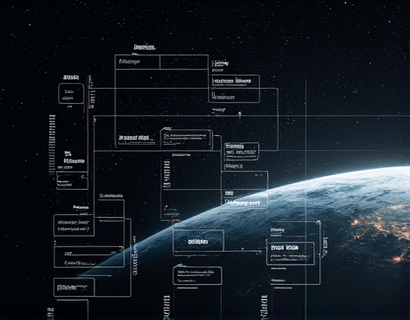Real-Time Government Data: Empowering Citizens and Enhancing Civic Participation via Open Access and Accountability
In the digital age, the transformation of government operations and citizen engagement has been profound, driven largely by the availability of real-time government data. This data, when made openly accessible, serves as a powerful tool for enhancing civic participation and ensuring government accountability. The concept revolves around providing citizens with immediate and transparent access to government information and services, thereby fostering an informed and active citizenry.
The shift towards open access to government data is not merely a technological advancement but a fundamental shift in governance philosophy. It embodies the principles of transparency, accountability, and citizen empowerment. By making data readily available, governments can demonstrate their commitment to openness and responsiveness, which are crucial for maintaining public trust and support.
Enhancing Civic Participation
Real-time government data plays a pivotal role in enhancing civic participation. When citizens have access to timely and accurate information, they can make informed decisions about the issues that affect their communities. This access enables individuals to engage more effectively in the democratic process, whether through voting, community organizing, or direct advocacy.
For instance, real-time data on public spending can help citizens track how tax dollars are being used, allowing them to hold elected officials accountable. Similarly, data on environmental quality, public health, and education can empower citizens to advocate for policies that address their specific needs and concerns. This level of engagement is crucial for building a more participatory and responsive democracy.
Promoting Government Accountability
Accountability is a cornerstone of good governance, and real-time data is an invaluable tool in this regard. By providing immediate access to government operations and decisions, citizens can monitor and evaluate the performance of public institutions. This transparency helps to deter corruption and inefficiency, as officials are more likely to act in the public interest when they know their actions are being closely watched.
Real-time data can also facilitate the creation of watchdog organizations and citizen monitoring groups. These entities can analyze government data to identify patterns of misconduct or inefficiency and raise awareness among the public. This collective scrutiny is essential for ensuring that government actions align with public expectations and legal standards.
Real-Time Data and Emergency Response
One of the most critical areas where real-time government data shines is in emergency response and disaster management. During crises such as natural disasters, accurate and up-to-date information can save lives and resources. Real-time data on weather conditions, evacuation routes, and resource availability can help authorities coordinate their efforts more effectively and ensure that aid reaches those in need promptly.
Citizens, too, can benefit from real-time emergency data. Applications and platforms that aggregate and disseminate this information can keep the public informed about safety measures and updates, reducing panic and confusion. This immediate access to critical information is invaluable in situations where every minute counts.
Open Data and Innovation
The availability of real-time government data also spurs innovation and economic growth. Developers and entrepreneurs can leverage this data to create new applications and services that address societal challenges. For example, data on traffic patterns can be used to develop smart transportation solutions, while health data can inform the creation of health management apps.
These innovations not only improve the quality of life for citizens but also create new economic opportunities. By fostering a culture of open data, governments can stimulate technological advancement and position themselves as leaders in the digital economy.
Challenges and Considerations
Despite the numerous benefits, the implementation of real-time government data initiatives is not without challenges. One of the primary concerns is data quality and accuracy. Ensuring that the information provided is reliable and up-to-date requires robust data management systems and continuous monitoring.
Another challenge is the digital divide. Not all citizens have equal access to the internet and digital technologies, which can exacerbate existing inequalities. To address this, governments must invest in infrastructure and education to ensure that all citizens can benefit from open data initiatives.
Privacy and security are also critical considerations. While transparency is essential, it must be balanced with the protection of sensitive information. Governments need to implement strong data protection measures to safeguard personal information and maintain public trust.
Case Studies: Successful Implementations
Several governments around the world have successfully implemented real-time data initiatives, demonstrating their positive impact on civic engagement and governance. For example, the city of New York launched NYC OpenData, a comprehensive platform that provides access to a wide range of city data sets. This initiative has empowered citizens to create maps, visualizations, and applications that enhance urban planning and public services.
In another example, the UK's Data.gov.uk offers a vast repository of government data, fostering innovation and transparency. Developers have used this data to create tools that track public spending, monitor environmental impacts, and improve healthcare services. These initiatives have not only increased public trust but also driven economic growth through the creation of new businesses and jobs.
The Future of Real-Time Government Data
As technology continues to evolve, the potential for real-time government data to transform civic engagement and governance is immense. The integration of advanced analytics, artificial intelligence, and the Internet of Things (IoT) can further enhance the utility and impact of this data.
For instance, AI can help analyze large volumes of data to identify trends and insights that might not be immediately apparent. This can inform policy decisions and improve service delivery. IoT devices can provide real-time information on infrastructure conditions, environmental quality, and public safety, enabling more proactive and responsive governance.
Moreover, the increasing adoption of blockchain technology can enhance data integrity and security, ensuring that the information provided is tamper-proof and trustworthy. This can further bolster public confidence in government data initiatives.
Conclusion
Real-time government data is a powerful tool for empowering citizens and enhancing civic participation. By providing immediate and transparent access to government information, these initiatives promote accountability, foster informed decision-making, and drive innovation. While challenges exist, the benefits of open data are clear and compelling. As more governments embrace this approach, we can expect to see a more engaged, informed, and active citizenry, ultimately leading to better governance and a more prosperous society.










































